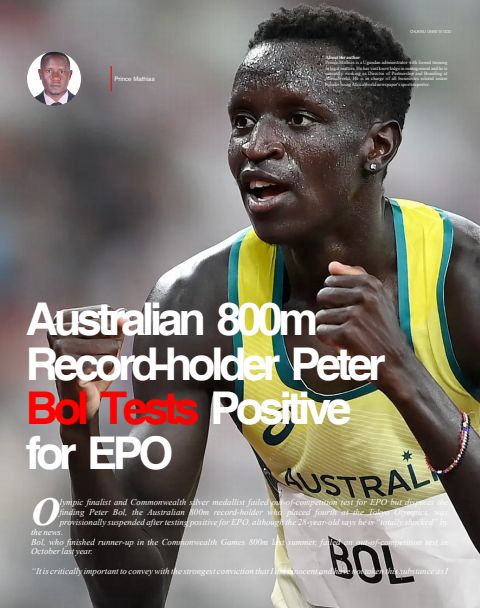By: Prince Mathias

Olympic finalist and Commonwealth silver medallist failed out-of-competition test for EPO but disputes the finding.
Peter Bol, the Australian 800m record-holder who placed fourth at the Tokyo Olympics. He was provisionally suspended after testing positive for EPO, although the 28-year-old says he is “totally shocked” by the news.
Bol, who finished runner-up in the Commonwealth Games 800m last summer. But, failed an out-of-competition test in October last year.

“It is critically important to convey with the strongest conviction that I am innocent and have not taken this substance as I am accused,” he said. “I ask that everyone in Australia believe me and let the process play out.”
He added: “To be clear, I have never in my life purchased, researched, possessed, administered or used synthetic EPO or any other prohibited substance,” he said. “I voluntarily turned over my laptop, iPad and phone to Sport Integrity Australia to prove this. Above all, I remain hopeful that the process will exonerate me.”
Bol’s national record is 1:44.00, which he set in Paris last year, and in 2021 he became the first Australian to reach an 800m final at the Olympics since 1968.
He was born in Sudan but fled the civil war there as a child and moved to Australia, settling in Perth and completing a degree in construction management.
At last year’s Commonwealth Games he finished just ahead of English duo Ben Pattison and Jamie Webb as Wyclife Kinyamal of Kenya took victory.
Athletics Australia CEO Peter Bromley said: “There are procedural fairness and investigative consideration that constrain how much we can say, and at this point it would be inappropriate for Athletics Australia or anyone else to speculate about the specific details or pre-empt any outcome.
“However what we can say is that learning about this adverse analytical finding was both extremely concerning and completely out of the blue, and we will support Sport Integrity Australia who are leading the investigation into the matter.
“As a signatory to the World Anti-Doping Code and the Australian National Anti-Doping Policy, Athletics Australia condemns doping in sport, and we work hard to ensure athletics in Australia is a clean and fair sport for all athletes, including providing anti-doping education in partnership with Sport Integrity Australia.
“We fully support the highly effective testing protocols that exist to ensure that anyone who breaches the anti-doping policy is caught and appropriately sanctioned.
“Every athlete, coach and spectator wants and deserves a level playing field.
“We appreciate the efforts of Sport Integrity Australia to conduct an extensive regime of testing during and out of competition to ensure our sport is fair and equitable at all times.
“Our primary consideration right now is that the appropriate process is followed and that it is not undermined by inappropriate speculation.
“The welfare of our athletes remains critical through this process, and we will continue to do all that is appropriate to ensure both Peter and other athletes, coaches and support staff are provided with the necessary support.”
Elsewhere in anti-doping news, The Athletics Integrity Unit (AIU) charged Belarusian coach Yury Maisevich for alleged breaches of the World Athletics’ Integrity Code of Conduct relating to the withdrawal of sprinter Krystsina Tsimanouskaya from the Tokyo Olympic Games in 2021.
Tsimanouskaya’s participation in the women’s 200m was curtailed following her social media criticism of Belarusian athletics coaching staff for entering her in the 4x400m without her knowledge.
Following Tsimanouskaya’s public comments, which hit international headlines, team officials withdrew her from competition and the athlete claimed that they forced her to leave the Olympic Village and tried to send her back to Belarus.
However, she sought protection from the Japanese police at the airport and she has since settled in another country.
The AIU alleges that, in respect of these circumstances of Tsimanouskaya’s removal from the Olympic Games, Maisevich did not act with integrity and acted in bad faith, failed to safeguard the athlete’s dignity and his actions constituted verbal and mental harassment and that he brought athletics generally into disrepute.
“An important role of the AIU is to safeguard athletes and protect them from harassment. The AIU has investigated this matter thoroughly and considers there is a case to answer for a breach of the Integrity Code of Conduct,” said AIU Head Brett Clothier.


